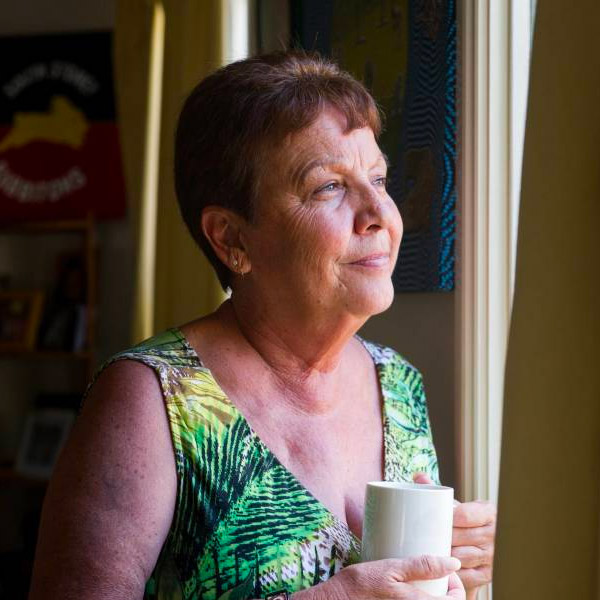- Entry type: Person
- Entry ID: AWE23090768
Whetnall, Tracey Fowler
(1963 – 2019)
- Born 30 June 1963, Sydney, New South Wales, Australia
- Died 10 July 2019, Canberra, Australian Capital Territory, Australia
- Occupation Public servant
Summary
Tracey Whetnall’s lifelong dedication to making a difference through supporting Aboriginal people was recognised by her inclusion on the ACT Honour Walk in 2020. She had been appointed the first Indigenous Official Visitor to the Alexander Maconochie Centre in 2011 and also conducted many cultural awareness workshops for staff of the Australian Federal Police and ACT Corrective Services.
Tracey Whetnall was inscribed on the ACT Women’s Honour Roll in 2020.
Details
“Tracey Fowler Whetnall was born in Sydney Women’s Hospital on 30 June 1963, one of the six children of Iris Fowler (nee Dixon), a Dharawal woman, and John Fowler, a Scottish man. Until her marriage in 1981 she lived in Ashcroft, a south-western suburb of Sydney. On leaving school, Tracey joined the Department of Defence, first as a trainee and later with the Army Reserve, where she worked as a cook and met her husband. In 1983, she enrolled in Tranby Aboriginal College, Glebe, where she gained her Year 12 High School Certificate. She joined the NSW Public Service Commission in 1984 where her duties involved supporting the career development of Aboriginal public servants. She divorced her husband that year.
In 1988, Tracey moved to the ACT where she undertook various roles in the Australian Public Service. She gave birth to her only child, Shara Fowler, in 1990 and a few years later opened her successful business, Tracey Whetnall Consultancy, designed to promote Aboriginal Cultural Awareness. Throughout the 1990s, Tracey worked intensively with the Australian Federal Police, conducting many training workshops. Conscious of her family’s anxiety in dealing with police, she became an Interview Friend, being frequently called to the watch house to ensure that Aboriginal people felt supported during interviews.
In 2009, the ACT established its first prison for both male and female detainees, the Alexander Maconochie Centre (AMC). In 2011 Tracey was appointed the AMC’s first Indigenous Official Visitor by the Minister for Justice, to whom she reported directly at quarterly meetings. She was empowered under legislation to undertake independent inspections of adult correctional facilities in the ACT, and places outside correctional centres where detainees worked or participated in activities. She received complaints from detainees about any aspect of their detention and was obliged to investigate all such complants. She made recommendations to the Justice and Community Safety Directorate and provided written reports to the Minister on the outcome of such complaints. The Annual Report of the Justice and Community Safety directorate in 2014-15 described its Official Visitors as ‘the eyes and ears of the Minister’. Tracey was on the Board of the Gugan Gulwan Association Youth Corporation, established in 1992 to support young Aboriginal and Torres Strait Islander people and their families in the ACT and surrounding regions. In 2012-13, for example, Tracey’s Consultancy facilitated 11 Aboriginal and Torres Strait Islander Cultural Awareness Training Programs, attended by 187 of its executives and staff and all operational members of ACT Corrective Services, as part of their induction. During NAIDOC Week that year she addressed the 35th Annual Aboriginal Hostels Limited’s function in her role as AMC Indigenous Official Visitor. In 2014-15 she reported that she had visited adult correctional centres twice weekly on 43 occasions and found a significant rise in the number of Aboriginal and Torres Strait Islander detainees. The following year the number of her visits had risen to 96. She attributed this to a futher increase in the number of detainees and recidivists. She believed that many of the detainees’ complaints, particularly about their interactions with Indigenous case managers, related to the heavy workloads of these staff members and detainees’ misunderstanding of their role and responsibilities. A number of complainents, she observed, seemed unaware of the programs available to them and how participation in those programs could assist in their parole applications or their reintegration into the community. Tracey concluded both her annual reports with the comment ‘Most Issues that I have raised over the year are being dealt with by Corrections staff to the best of their abilities …(they) are very approachable about any concerns that I have’. Tracey officially resigned as Official Visitor in 2019 due to ill health.
A passionate supporter of the South Sydney Rabbitohs, Tracey was also fundamental to the success of Narrabundah’s Boomanulla Oval. She was immensely proud of her family’s history, reporting that her great-aunt, one of the Stolen Generations, was placed as a domestic for Dame Nelly Melba and that her Indigenous great-grandfather served as a Light Horseman in the First World War, sadly without recognition. Tracey died of cancer on 10 July 2019 aged 56. Her lifelong dedication to making a difference through raising cultural awareness and her achievements as the ACT’s first Aboriginal and Torres Strait Islander Official Visitor and the longest serving in Australia was recognised by the ACT Government by her inclusion on the ACT Honour Walk in 2020.”
Published resources
-
- Annual report / Justice and Community Safety Directorate, https://nla.gov.au/nla.obj-632550458